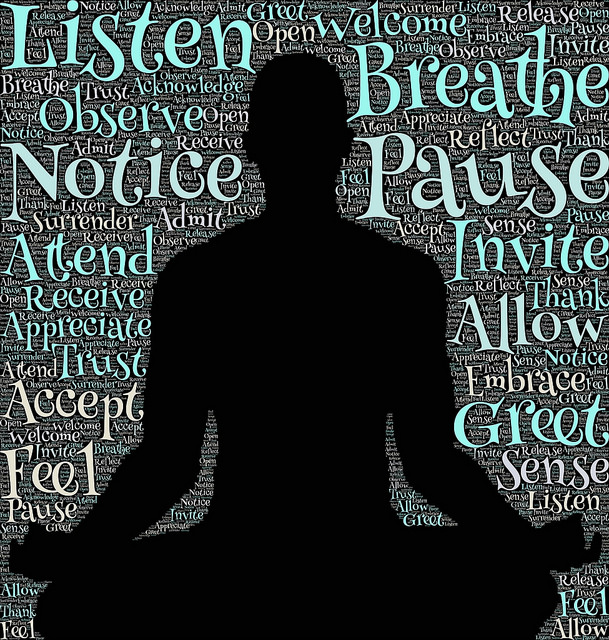Yesterday, after a rather long day at work, I needed to relax.
I straightened my legs and grabbed the closest thing in sight to read. The closest thing was The Guardian, folded open to an article titled, “Is mindfulness making us ill?”.
I started to gobble it down. As an editor of elephant journal, I was naturally intrigued.
The further I read, the more I thought, “We are really missing something here.”
I’m not a teacher or an expert in meditation, Buddhism or mindfulness. I’m not a psychologist, either. I’ve been practicing guided meditation now for about four years (so no, it’s not a life-long practice).
It hasn’t f***ed me up, but it has deeply affected in my life.
It started in the summer of 2012. I had just broken up with my boyfriend of two and a half years—followed by a series of messy, sort-of-relationship-tries. At the same time, I started a new job in a daily newspaper.
I didn’t sleep well, and I kept waking up for various reasons—unfinished tasks, titles, loneliness. In retrospect, I think I was bit unhappy and a bit stressed.
I knew something had to change.
In the morning, I forced myself to go for long runs, which got my endorphin levels high enough to get me through the day. And to balance the mix, I smoked, I drank and I partied.
I wanted to escape the awful restless feeling that nested in my mind immediately after work.
Then, one bored Sunday evening, I remembered a book that had been lying on my bookshelf for a while. The book included a series of interviews with the Dalai Lama. I started to read it, thinking that I would find some sort of enlightenment at the end.
Of course, I didn’t.
Encouraged by the book, I tried to meditate for the first time in my life. I sat on the floor, crossed my legs and told my mind to relax. (Try yelling, “relax!” at someone who is already stressed—I can tell you that it doesn’t work that well.)
After a minute or so, my thoughts would be spinning and bouncing back and forth. I felt anxious. And the book was recommending me to sit 10 more minutes. No way. That was the end of my first session.
But the book seeded a little plant. I got curious. I wanted to know more. I started to go to regular meditation sessions and read, buy and loan books about Zen Buddhism and simple meditation practices.
The whole “Dalai Lama thing” became a bit of a joke between me and some of my friends. To many, I didn’t say anything—I guess I was afraid they would think I’d gone bonkers.
I rarely use the word “mindfulness” when I talk about meditation. Meditation for me is meditating on my thoughts, paying attention to them. Watching them pass. Focusing on my breath. There’s no trick, as my Tibetan Buddhist teacher says.
When I want to relax, I usually see a massage therapist, go to my favorite coffee shop or grab the Guardian to read. Works for me—maybe not for you.
But for me, that’s forgetting the present, not tuning into it.
Meditation is not easy. It’s not necessarily a divine experience, especially for first-timers. But we can train our mind. Train ourselves to be in the present.
I have the idea, the urge to meditate much more often than I do it in reality. But when I do, I sit down on my meditation cushion (any cushion could do), eyes half-closed, and rest my hands on my knees.
Just that.
And then I breathe, in and out, my normal breath, thinking of it going down to my belly. Only that. Then I start paying attention to other senses; I smell the air, maybe taste something in my mouth, listen to the noises echoing from the street, and start to take it all in, even the distractions, while breathing normally. I pay attention to my body, I might feel my heart slightly beating. I might feel a slight pain here and there. Then finally, I focus on my thoughts. I think of them like a film strip in front of my mind. I’m aware of them, but I don’t have to go along with them.
And that’s it. For five minutes to 50 minutes, all the same. Always going back to the breath.
And why do I do that? It stops the buzz, the hiss and the rush in my head. It brings clarity, in a word. At a deeper lever, I feel much more comfortable with myself. Body and mind.
And yes, it has made me happier.
It has nothing to do with drifting away. When I meditate, I’m more rooted in the present than I am at any other time.
It’s not a pill; not a cure. It’s an ancient practice, a philosophy—not a 21st century trend.
It’s meditation.
No biggie if it’s not your thing. Practicing meditation in workplaces, as the article described, sounds like a great initiative from the boss—but it has little to do with the actual meditation practice. By the sound of it, that’s a method of relaxation.
As the American Buddhist nun Pema Chödrön says, we often stop doing things just when they are getting interesting.
“Meditation takes us just as we are, with our confusion and our sanity.” ~ Pema Chödrön
And the wonderful thing about it is, nowadays, no amount of time ever seems long enough.
~
Relephant Read:
Meditation Will F*ck You Up.
~
Author: Sara Kärpänen
Editor: Toby Israel
Photo: John Hain/Flickr
~











Read 1 comment and reply